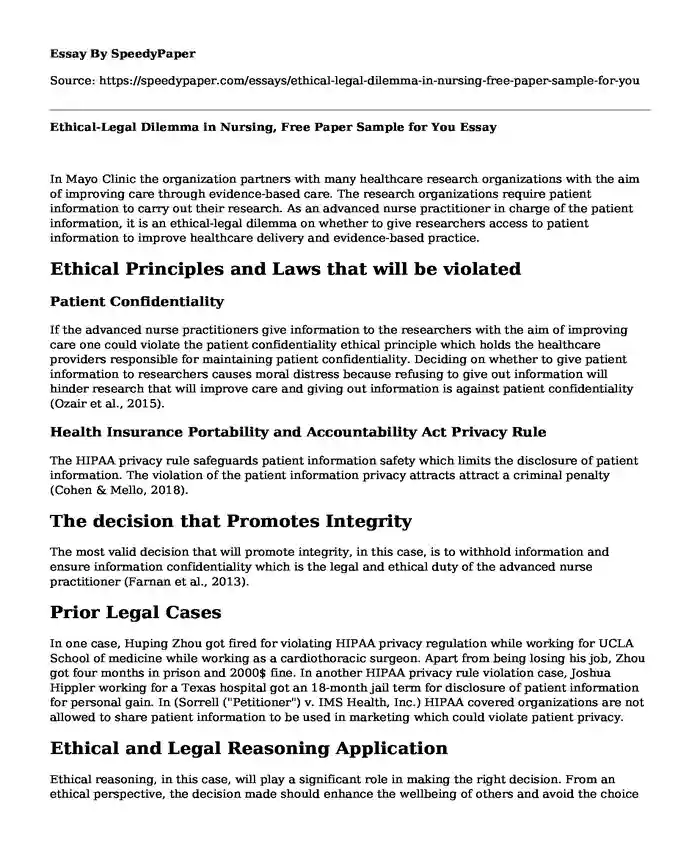
| Type of paper: | Course work |
| Categories: | Nursing Ethical dilemma |
| Pages: | 3 |
| Wordcount: | 636 words |
In Mayo Clinic the organization partners with many healthcare research organizations with the aim of improving care through evidence-based care. The research organizations require patient information to carry out their research. As an advanced nurse practitioner in charge of the patient information, it is an ethical-legal dilemma on whether to give researchers access to patient information to improve healthcare delivery and evidence-based practice.
Ethical Principles and Laws that will be violated
Patient Confidentiality
If the advanced nurse practitioners give information to the researchers with the aim of improving care one could violate the patient confidentiality ethical principle which holds the healthcare providers responsible for maintaining patient confidentiality. Deciding on whether to give patient information to researchers causes moral distress because refusing to give out information will hinder research that will improve care and giving out information is against patient confidentiality (Ozair et al., 2015).
Health Insurance Portability and Accountability Act Privacy Rule
The HIPAA privacy rule safeguards patient information safety which limits the disclosure of patient information. The violation of the patient information privacy attracts attract a criminal penalty (Cohen & Mello, 2018).
The decision that Promotes Integrity
The most valid decision that will promote integrity, in this case, is to withhold information and ensure information confidentiality which is the legal and ethical duty of the advanced nurse practitioner (Farnan et al., 2013).
Prior Legal Cases
In one case, Huping Zhou got fired for violating HIPAA privacy regulation while working for UCLA School of medicine while working as a cardiothoracic surgeon. Apart from being losing his job, Zhou got four months in prison and 2000$ fine. In another HIPAA privacy rule violation case, Joshua Hippler working for a Texas hospital got an 18-month jail term for disclosure of patient information for personal gain. In (Sorrell ("Petitioner") v. IMS Health, Inc.) HIPAA covered organizations are not allowed to share patient information to be used in marketing which could violate patient privacy.
Ethical and Legal Reasoning Application
Ethical reasoning, in this case, will play a significant role in making the right decision. From an ethical perspective, the decision made should enhance the wellbeing of others and avoid the choice that will lead to disapproval (Ozair et al., 2015). On the other hand, the right decision requires legal reasoning through the understanding of the HIPAA privacy rule requirements. Understanding the HIPAA privacy rule will prohibit the nurse from giving out information which could lead to criminal prosecution (Cohen & Mello, 2018).
Recommendation to Resolve Moral Distress
Creation of ethical standards
Ethical standards such as privacy and confidentiality should be reinforced within the organization in which patient information can only be accessed through the patient consent.
Creation of information security policies and guidelines within the organization.
Reconciling ethical standards and reasoning with the legal policies such as HIPAA privacy rules.
In conclusion, the ethical and legal decision for an advanced nurse practitioner in this dilemma is to withhold patient information and only allow access to patient information through the patient consent and ensuring the legal guidelines and information policy within the organization are followed without any omission. Both ethical and legal reasoning is critical in deciding to ensure patient information confidentiality.
References
20 Catastrophic HIPAA Violation Cases to Chill Your Blood. (2017, June 14). Retrieved from https://www.medprodisposal.com/20-catastrophic-hipaa-violation-cases-to-open-your-eyes/
Cohen, I. G., & Mello, M. M. (2018). HIPAA and Protecting Health Information in the 21st Century. JAMA.
Farnan, J. M., Sulmasy, L. S., Worster, B. K., Chaudhry, H. J., Rhyne, J. A., & Arora, V. M. (2013). Online medical professionalism: patient and public relationships: policy statement from the American College of Physicians and the Federation of State Medical Boards. Annals of internal medicine, 158(8), 620-627.
Ozair, F. F., Jamshed, N., Sharma, A., & Aggarwal, P. (2015). Ethical issues in electronic healthrecords: a general overview. Perspectives in clinical research, 6(2), 73.
Sorrell v. IMS Health Inc., 131 S. Ct. 2653, 564 U.S. 552, 180 L. Ed. 2d 544 (2011).
Cite this page
Ethical-Legal Dilemma in Nursing, Free Paper Sample for You. (2022, Jun 16). Retrieved from https://speedypaper.net/essays/ethical-legal-dilemma-in-nursing-free-paper-sample-for-you
Request Removal
If you are the original author of this essay and no longer wish to have it published on the SpeedyPaper website, please click below to request its removal:
- Analysis of Quantitative Research Methodology. Essay Example.
- Free Literary Essay: Death as Reflection of Life in The Death of Ivan Ilyich
- White Collar Crimes in the US, Free Essay for Everyone
- Argumentative Essay Example: Marijuana Should Be legalized in the US
- Free Essay with a Reflection of the Writing Course Experience
- Essay Example on Impacts of Social Media in Society
- Free Essay: The Concept of Futures Techniques
Popular categories




